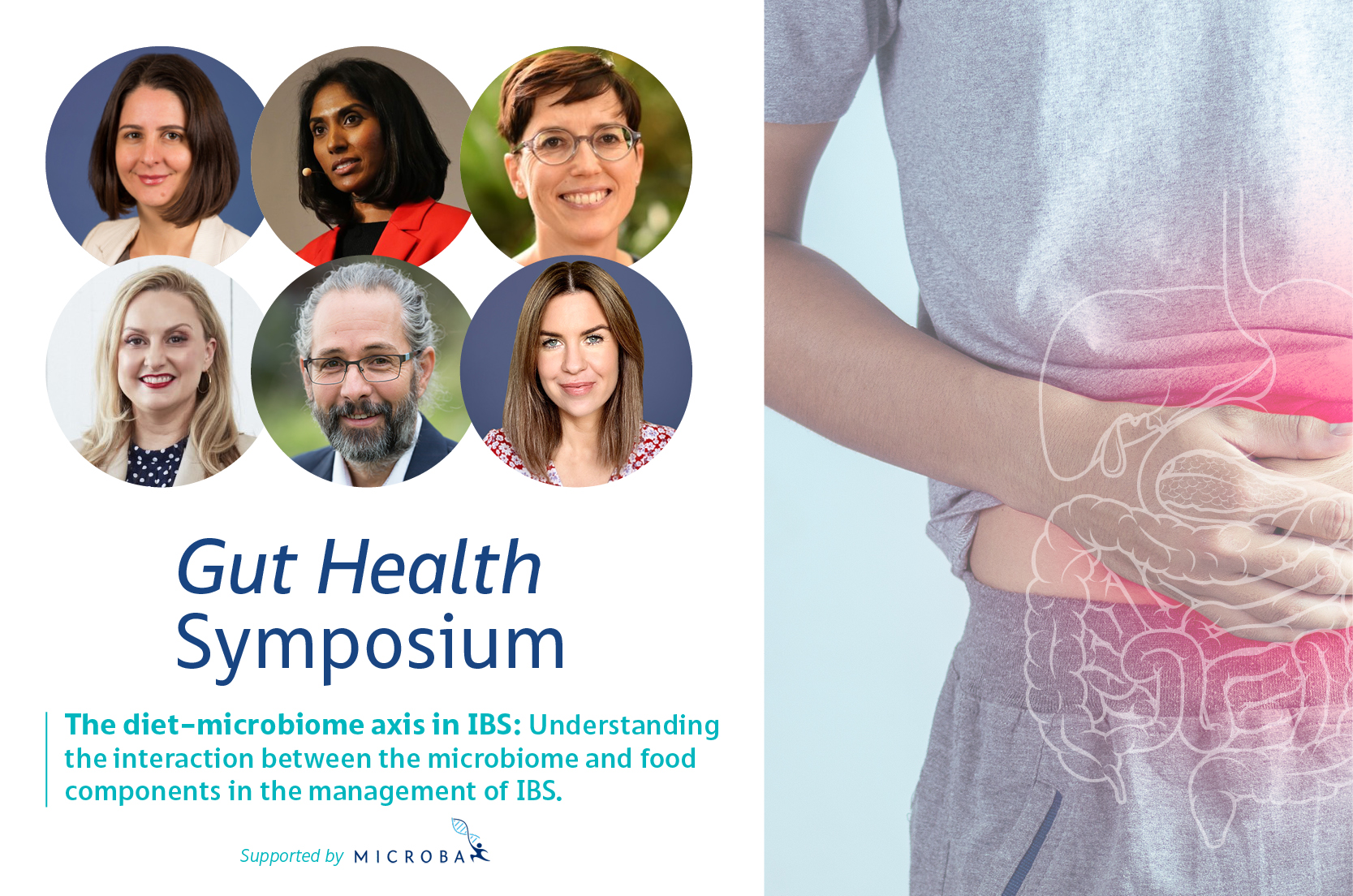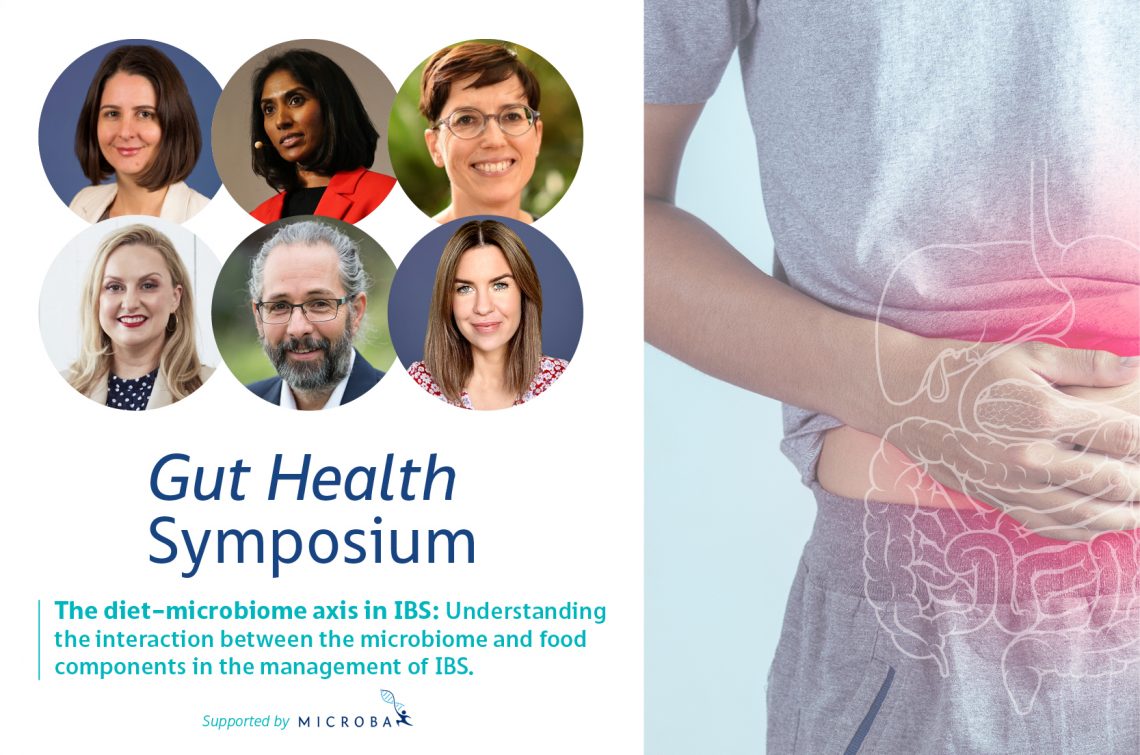In this Gut Health Symposium – supported by Microba – we’re bringing you five key experts to understand the interaction between the microbiome and food components in the management of IBS.
Tune into all six webinars to learn about the latest research in dietary approaches for supporting microbiome health through the management of IBS, the role of different food components within the microbiome, the impact of low FODMAP on diet quality and the microbiome, the practical application of using probiotics and prebiotics in the management of IBS and the clinical application of microbiome analysis in Dietetic practice.
This symposium will provide a deeper understanding of what role the gut microbiome plays in health, what to look out for in an analysis report and how to empower patients to make more informed choices about nutrition for their gut health.
This Gut Health Symposium has been developed for healthcare professionals. The information in this Symposium is not, and is not intended to be, medical advice. Professional medical advice should be obtained before taking action on any issue covered within the Symposium.
Featuring:
Evidence-based dietary approaches for supporting microbiome health during the management of IBS — Dr Paula Smith-Brown
 Irritable Bowel Syndrome (IBS) remains poorly understood despite an estimated 1 in 5 Australian suffering from this condition at some point in their life. Recent research is beginning to characterise the microbial dysbiosis associated with IBS. In this talk, Dr Paula Smith-Brown will be reviewing the latest research utilising advanced multi-omics technologies to characterise the disordered diet-microbiome axis seen in IBS. This research will be translated into evidence-based practical dietary approaches targeted towards supporting microbiome health during the clinical management of IBS.
Irritable Bowel Syndrome (IBS) remains poorly understood despite an estimated 1 in 5 Australian suffering from this condition at some point in their life. Recent research is beginning to characterise the microbial dysbiosis associated with IBS. In this talk, Dr Paula Smith-Brown will be reviewing the latest research utilising advanced multi-omics technologies to characterise the disordered diet-microbiome axis seen in IBS. This research will be translated into evidence-based practical dietary approaches targeted towards supporting microbiome health during the clinical management of IBS.
Dr Paula Smith-Brown is the Lead Dietitian at Microba. She has over 10-years of clinical experience with a specialist interest in managing allergies and intolerances. Her PhD explored the interaction between diet, microbiome and body composition in children. In this talk she will be using the skills developed in her PhD to delve deep into the metagenomics science to understanding dysbiosis in IBS and then put her Clinical Dietitian’s hat on to explain what this means for you and your patients.

Gut microbes: who they are and how to feed them — Dr Anneline Padayachee
The gut microbiota is the newest member of the human body. It has always been here, but unknown to most of us for eons. While humans are not known to be fermenters, we are. Our colon is home to the gut microbiome, a collection of bacteria that vary in diversity and number and are directly impacted by what they get to ferment. This seminar will explore our microbiome: who they are, what they do, what they eat, and what your role is in feeding them.
Dr Anneline Padayachee is a Nutritional Food Scientist with expertise that crosses both those sciences. With research assessing the role of processing on nutrient absorption, Anneline has worked in academia and with industry to help understand how consumers can get the most out of the food we eat. A major component of her work has been understanding the various components of the digestive tract, particularly the colon, and how we should feed our bacteria.

The low FODMAP diet: does it work, and how does it impact diet quality and the microbiome? — Dr Heidi Staudacher
This presentation will review the clinical dietetic management of irritable bowel syndrome, including the clinical guidelines published by the British Dietetic Association, review the evidence for the efficacy of the low FODMAP diet, the ability of the microbiome to predict effectiveness and review the impact of the diet on the microbiome and diet quality.
Dr Heidi Staudacher is an Accredited Practising Dietitian with extensive experience in the clinical management of individuals with gastrointestinal disorders. She undertook her PhD at King’s College London investigating the role of diet in irritable bowel syndrome (IBS) and its impact on the gut microbiota. She has published numerous papers, including the first placebo-controlled trial of low FODMAP dietary advice in IBS. Heidi is now an Alfred Deakin Postdoctoral Research fellow at the Food and Mood Centre, extending her research to investigate the relationship between diet, the gut and mental health.

Dietetic application of Microba analysis in private practice — Geraldine Georgeou
Gut microbiome analysis is a valuable tool in clinical practice, making understanding the key insights critical to maximising its utility. This session will explore in-practice case studies and look at how utilising microbiome analysis in the management of complex clinical patients can guide and personalise dietary interventions. The webinar will also delve into the role of the Dietitian within the multidisciplinary team in managing microbiome health.
Geraldine Georgeou is an Accredited Practising Dietitian with over 20 years’ experience. She has been a Gastroenterology Dietitian at The Prince of Wales Hospital in Sydney and member of the Council for the Gut Foundation. She Co-authored “The Gut Foundation Cook Book” and authored The Australian Healthy Skin Diet released in March 2020.
Geraldine’s Dietetic experience includes metabolic and gastrointestinal health, dermatology, auto immune disease and prevention and management of insulin resistance, type 2 diabetes and arthritis. Geraldine is also director of two Sydney clinics, Designer Diets, and part of the Nutrition Research department at Translational Gastroenterology at Western Sydney University.
Two webinars with Dr Jason Hawrelak:
Evidence-based practical application of probiotics in the management of IBS:
Irritable bowel syndrome (IBS) is one of the most frequently encountered entities in clinical practice. Probiotics are live microbes that when ingested in adequate amounts confer health benefits on the host and have been used to treat IBS since the first studies were published in the 1950s. While the data is clear that probiotics can be helpful in the management of this condition, what often isn’t made clear is which specific probiotics are efficacious. This talk will overview the literature around probiotics in IBS and give guidance on which specific probiotic preparations have evidence of efficacy, as well as discuss practical issues around dosing.

Evidence-based practical application of prebiotics and specific fibres in the management of IBS:
There is often confusion about the role of dietary fibre and prebiotics in the management of irritable bowel syndrome (IBS). This webinar will delve into the research on this topic and give practical advice about the use of specific dietary fibres and prebiotic supplements to both decrease gastrointestinal symptoms and nourish the colonic microbiota.
Dr Jason Hawrelak is a clinician, researcher, and senior lecturer at the University of Tasmania with over 20 years’ experience in the field of natural medicine with an emphasis on gastrointestinal disorders. He has a strong interest and PhD in the field of the gastrointestinal microbiota, looking at the clinical application of pre and probiotics. Dr Hawrelak has authored 17 textbook chapters and 30 research papers. He is the founder and head of research at ProbioticAdvisor.com.

Master of Ceremonies — Anita Tait
Anita Tait is an Accredited Practising Dietitian and Pharmacologist and has worked within corporate health, food industry and the pharmaceutical industry for the past 10-years. Anita specialises in IBS and other Functional Gastrointestinal Disorders and is an advocate for the clinical application of microbiome profiling in Dietetic practice. Anita works at Microba and is involved in supporting Dietitians in the clinical utility of microbiome analysis in practice.
Supported by 
Tickets are now CLOSED.
Learning materials (webinar recordings and lecture notes) are released on 1st, 8th and 15th May 2020 at 5pm (Syd/Melb time). CPD hours are applicable for Australian and New Zealand dietitians. Check your local country requirements to see if you can claim for continuing education.
Frequently asked questions:
When can I access the materials?
Learning materials (webinar recordings and lecture notes) are released on 1st, 8th and 15th May 2020 at 5pm (Syd/Melb time). From this date, you can start learning immediately and work at your own pace.
What format is the symposium?
It includes six individual webinar recordings with slides and additional resources.
I’m busy this week; will I have access after the release date?
Absolutely. Your symposium ticket gives you lifetime access. Invest in it once, and it’s yours forever.
What’s the cost?
The symposium costs only $49 (AUD), thanks to the support of Microba.
What’s the benefit of purchasing before release?
This symposium can ONLY be purchased prior to release. Once it is released on 1st May 2020, tickets will close.
When does registration close?
Registrations and tickets close at 5pm (Syd/Melb time) on 1st May 2020. Available for THREE WEEKS ONLY.
This Gut Health Symposium has been developed for healthcare professionals. The information in this Symposium is not, and is not intended to be, medical advice. Professional medical advice should be obtained before taking action on any issue covered within the Symposium.

Gut Health Online Symposium
- *Price is in AUD and excludes gst
